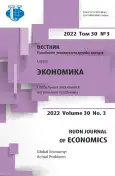Relationship between empowerment and leadership in the economy
- Авторлар: Danov D.1, Tileva I.1
-
Мекемелер:
- University of National and World Economy (UNWE)
- Шығарылым: Том 30, № 3 (2022): Global Economy: Actual Problems
- Беттер: 292-303
- Бөлім: MANAGEMENT
- URL: https://journal-vniispk.ru/2313-2329/article/view/324174
- DOI: https://doi.org/10.22363/2313-2329-2022-30-3-292-303
- ID: 324174
Дәйексөз келтіру
Толық мәтін
Аннотация
There are various theories about how a leader should behave and what are the characteristics of a leader in the context of the modern economic world and business. The question of how actually an individual becomes a leader is of interest to many people. Very often the word “leader” is used as an equivalent of a person gaining power in a particular structure or organization. Аlso the words „leader“ and „manager“ are often misused as synonyms. Тhere is a big difference between the two concepts. Мanager in the economic world can take a position as a continuation of personal and professional qualities which will elevate him in the structural hierarchy. Also, manager could be chosen for the position by external factors. In both cases, this is not a matter of choice of the group. If the manager has leadership qualities, he could be recognized by the group later, but he could also be rejected. Placing a certain individual, who is not chosen by the group, in a leading role is a subject of analysis. An experiment with students is conducted so to prove the hypothesis. The experiment aims to determine whether there is a connection between empowerment and leadership, fundamentally distinguishing the fact that empowerment does not presumably make the individual leader. For the purposes of the experiment, fictional information about a non-existent country is provided. In this way, a simulation environment is created. Each student has own task and must defend own draft budget in a discussion. The simulation aims to observe not mostly the success of defending own draft budget, but the behavior and unconscious leadership skills of the participants.
Негізгі сөздер
Авторлар туралы
Daniel Danov
University of National and World Economy (UNWE)
Email: danov@unwe.bg
ORCID iD: 0000-0001-8865-6052
PhD, Associate Professor, International Economic Relations and Business Department, Intermational Economics and Policy Faculty
8-mi dekemvri St, Sofia, 1700, BulgariaIvet Tileva
University of National and World Economy (UNWE)
Хат алмасуға жауапты Автор.
Email: ivet.tileva@gmail.com
ORCID iD: 0000-0001-7726-1258
PhD, International Economic Relations and Business Department, Intermational Economics and Policy Faculty
8-mi dekemvri St, Sofia, 1700, BulgariaӘдебиет тізімі
- Andreadis, N.A. (2002). Leadership for civil society: Implications for global corporate leadership development. Human Resource Development International, 5(2), 143-149
- Bono, J.E., & Ilies, R. (2006). Charisma, positive emotions and mood contagion. The Leadership Quarterly, 17(4), 317-334
- Dasborough, M.T., Ashkanasy, N.M., Tee, E.Y., & Herman, H.M. (2009). What goes around comes around: how meso-level negative emotional contagion can ultimately determine organizational attitudes toward leaders. Leadership Qurterly , 20(4), 571-585
- Den Hartog, D.N., & Verburg, R.M. (1997). Charisma and rhetorics: Communacative techniques of international business leaders. The Leadership Quarterly, 8(4), 355-391.
- Fredrickson, B.L. (2003). The Value of Positive Emotions: The Emerging Science of Positive Psychology Is Coming to Understand Why It’s Good to Feel Good. American Scientist, 91, 330-335.
- Gardner, W.L., & Avolio, B.J. (1998). The charismatic relationship: A dramaturgical perspective. The Academy of Management Review, 23(1), 32-58.
- Gardner, W.L., & Martinko, M.J. (1988). Impression Management in Organizations. Journal of Management, 14(2), 321-338.
- Haney, C., Banks, C., & Zimbardo, P. (1973). A Study of Prisoners and Guards in a Simulated Prison. Reprinted in D. Potter, J. Anderson, J. Clarke et al. (1981). Society and the Social Sciences: An Introduction. Retrieved from http://www.garysturt.free-online.co.uk/zimbardo.htm
- Howard, E. (2001). Political Leadership (New Horizons in Public Policy series). Edward Elgar Publishing, 226 p.
- Hsee, C., Hatfield, E., Carlson, J., Chemtob, C. (1990). The Effect of Power on Susceptibility to Emotional Contagion. Cognition and Emotion, 4(4), 327-340.
- Jeanes, E. (2019). A Dictionary of Organizational Behaviour. Oxford University Press.
- Jin, T., Choi, J. & Johnson, S. (2013). Reciprocal interactions between group perceptions of leader charisma and group mood through mood contagion. The Leadership Quarterly, 24(4), 463-476.
- Klink, B. (1967). The Third Wave presents inside look at Fascism. The Cubberley Catamount, 11(14), page 3.
- Shamir, B., Arthur, M.B. & House, R.J. (1994). The Rhetoric of Charismatic Leadership: A Theoretical Extension, a Case Study, and Implications for Research. The Leadership Quarterly, 5(1), 25-42
- Slavik, J. Putnova, A. & Cebakova, A. (2015). Leadership as a Tool of Strategic Management. Procedia Economics and Finance. 26, 1159-1163 https://doi.org/10.1016/S22125671(15)00946-6
- Tenney, E., Costa, E. & Watson, R. (2021). Why Business Schools Need to Teach Experimentation. Harward Business Review. Retrieved from https://hbr.org/2021/06/why-business-schoolsneed-to-teach-experimentation?fbclid=IwAR2EPp8ZPIiKyh8EfaeAADyw-PYxEtyu-d_ AWUAcafupgUBeNsPdreE_rsc
- Waltera, F., Coleb, M.S., Vegt, G., Rubinc, R. & Bommerd, W. (2012). Emotion recognition and emergent leadership: Unraveling mediating mechanisms and boundary conditions. The Leadership Quarterly, 23(5), 977-991
- Walter, F. & Bruch, H. (2008). The positive group affect spiral: a dynamic model of the emergence of positive affective similarity in work groups. Journal of organizational behavior, 29(2), 239-261
- Winston, B. & Patterson, K. (2006). An Integrative Definition of Leadership. International Journal of Leadership Studies, 1(2), 6-66
Қосымша файлдар









